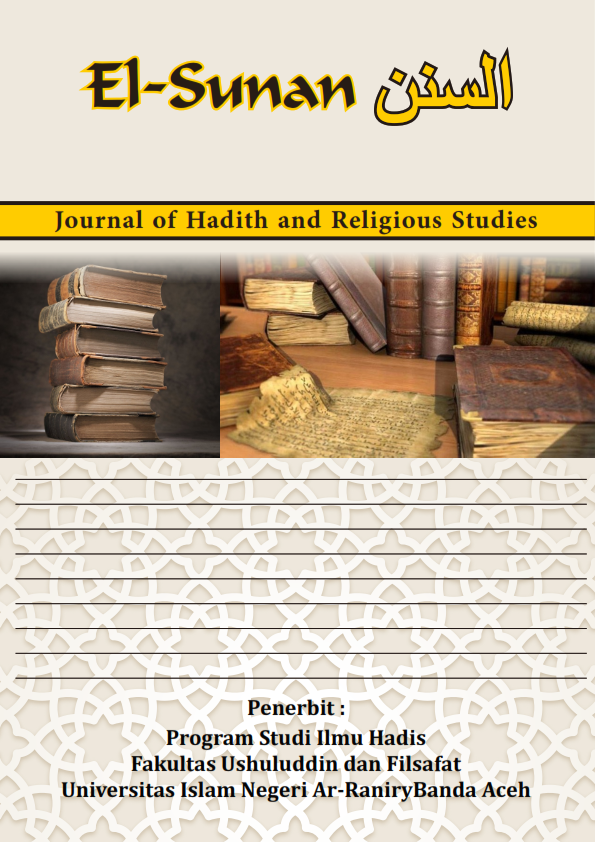The Mawdu‘i Method in Hadith Studies: Conceptual Framework and Practical Application
Keywords:
contextual interpretation, hadith methodology, mawḍū‘ī hadith, textual interpretation, thematic studiesAbstract
The thematic (mawḍū‘ī) approach to hadith is a methodological framework that focuses on collecting, classifying, and analyzing prophetic traditions (ḥadīth) related to a specific theme in order to achieve a comprehensive and applicable understanding. This study employs a qualitative library research method, drawing upon primary sources such as canonical hadith collections and secondary literature in the field of ʿUlūm al-Ḥadīth. The findings indicate that the thematic hadith methodology proceeds through several systematic stages: determining the research theme, exploring key concepts and vocabulary, gathering relevant hadith through takhrīj procedures, verifying the authenticity of isnād and matn, and analyzing the content of the traditions by considering asbāb al-wurūd, linguistic dimensions, and their correlation with Qur’anic verses. Furthermore, this study highlights three major interpretive techniques in thematic hadith research: (1) textual interpretation, which emphasizes the literal meaning of the hadith as expressed in its wording; (2) intertextual interpretation, which relates hadith to other narrations or Qur’anic verses with similar meanings; and (3) contextual interpretation, which emphasizes the relevance of hadith to socio-historical realities and considerations of public benefit (maṣlaḥah). A comparative analysis of these techniques reveals that each possesses its own strengths and limitations but are methodologically complementary: textual interpretation safeguards the linguistic authenticity of hadith, intertextual interpretation ensures the coherence of Islamic teachings, and contextual interpretation strengthens the relevance of hadith in addressing contemporary issues. Therefore, integrating these approaches is essential in thematic hadith methodology to produce interpretations that are not partial but comprehensive, normative, and applicable. The study concludes that the mawḍū‘ī method holds significant epistemological value in advancing contemporary hadith studies across legal, ethical, educational, and socio-cultural domains.
References
Al-Siba’i, M. (1999). Al-Sunnah wa Makanatuha fi al-Tashri’ al-Islami. Beirut: Dar al-Warraq.
Al-Tahhan, M. (2004). Taysir Mustalah al-Hadith. Beirut: Dar al-Ma’arifah.
Subhi al-Salih. (1986). ‘Ulum al-Hadith wa Mustalahuhu. Beirut: Dar al-‘Ilm li al-Malayin.
Abu Syuhbah, M. (2005). Fi Rihab al-Sunnah al-Kutub wa al-Sunan. Kairo: Dar al-Kutub al-Hadithah.
Abror, N. (n.d.). Pengantar Studi Hadis Maudhu’i . Jurnal UIN Sultan Hasanudin Banten.
Aisyah, N. D. (n.d.). Metode Maudhu’i Dalam Kajian Hadits.”. Universitas Islam Negeri Sultan Hasanudin Banten (Nd).
Asriandy, M. (n.d.). Metode Pemahaman Hadis. Ekspose.
Fadilah, L. (n.d.). PENGANTAR STUDI HADIS MAUDHU’I .
Gufron, S. (2020). Pengertian hadis maudhu’i dan sejarah pertumbuhannya.
Ira, M. (2018). Studi hadis maudhu’i . Al-Bukhari: Jurnal Ilmu Hadis, 1(2), 189–206.
Maizuddin, M. (2008). Metodologi Pemahaman Hadis. Hayfa Press.
Miski, M. (2021). Pengantar metodologi penelitian hadis maudhu’i . Maknawi.
Rasyid, M. D., St Aisyah Kara, M. A., & Maidin, M. S. (2016). Metodologi Pemahaman Hadis. Skripsi. Makassar: Ulumul Hadis UIN Alauddin.
Syarifudin, M., & Masruhan, M. (2021). Interpretasi Hadis: Antara Hermeneutika Dan Syarh Al-Hadits (Studi Komparatif). TAJDID: Jurnal Ilmu Ushuluddin, 20(2), 373–400.
Downloads
Published
How to Cite
Issue
Section
License
Copyright (c) 2025 Zainuddin Zainuddin

This work is licensed under a Creative Commons Attribution-NonCommercial-ShareAlike 4.0 International License.
- Authors retain copyright and grant the journal right of first publication with the work simultaneously licensed under an Attribution-NonCommercial-ShareAlike 4.0 International (CC BY-NC-SA 4.0) that allows others to share the work with an acknowledgment of the work's authorship and initial publication in this journal.
- Authors are able to enter into separate, additional contractual arrangements for the non-exclusive distribution of the journal's published version of the work (e.g., post it to an institutional repository or publish it in a book), with an acknowledgment of its initial publication in this journal.
- Authors are permitted and encouraged to post their work online (e.g., in institutional repositories or on their website) prior to and during the submission process, as it can lead to productive exchanges, as well as earlier and greater citation of published work.










